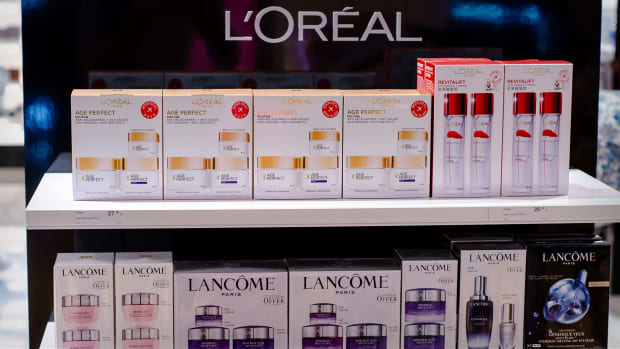When it comes to promises of looking younger, most people are more than willing to try just about anything that might soften a few fine lines carved in by the passage of time.
The proof of this is reflected in the burgeoning anti-aging skincare market. Valued at more than $40 billion in 2020 and estimated to grow 5.4% by 2028, there's no lack of interest in the possibility of a magical potion in a jar that can erase ten years off your face.
That said, there are a few skincare ingredients that are known for their tried and true effectiveness to reduce the signs of aging. Retinol and collagen are two of the most-researched, and since their results have been repeatedly proven, people tend to flock to skincare products that include them.
L'Oreal (LRLCY) has several anti-aging skincare lines that can be purchased at any drugstore, such as its Collagen line. These products are an affordable solution for customers unable to purchase high-end skincare containing these highly effective ingredients, but are still looking for a product that can provide anti-aging results.
But now a class action lawsuit has been launched against the beauty company, and if proof of what it alleges surfaces, it could make some customers think twice about L'Oreal as a reliable company to buy skincare from.

Shutterstock
'Widespread False and Deceptive Advertising'
Plaintiffs Rocio Lopez and Rachel Lumbra sued L'Oreal in August 2021, claiming that the company violated consumer protection laws and used "widespread false and deceptive advertising" to sell its products, specifically the Collagen line.
According to the filing, the product L'Oreal calls "the #1 Collagen Moisturizer in America" is actually not capable of providing anti-aging results. That's because collagen molecules are too large to penetrate the skin, a fact that's been confirmed by many a dermatologist.
The lawsuit seeks unspecified damages for people who have purchased the Collagen products in the past.
L'Oreal requested for the lawsuit to be dismissed, claiming that it never advertised the skincare line as being able to penetrate the skin or stimulate collagen production. On its official website, L'Oreal's copy reads, "Our collagen delivers increased hydration to the skin...instantly restores skin's cushion and bounce...in just 4 weeks, wrinkles appear more filled in."
L'Oreal's request for dismissal was denied by U.S. District Judge Andrew Carter Jr.
"It is wholly plausible that a reasonable consumer, shopping for cosmetics, saw a product named 'Collagen Moisture Filler,' promising to 'smooth wrinkles' and 'restore skin's cushion,' and associated this product with the cosmetic benefits of the collagen molecule," Carter wrote.
L'Oreal has faced similar lawsuits in the past. A class action lawsuit was filed against the cosmetics company in 2019 by Natalyia Borchenko, claiming that its Revitalift skincare line falsely advertises anti-aging results.
The same year, another class action lawsuit was filed in a U.S District Court for the Southern District of New York by Tammy Devane on behalf of a group, which alleges that L'Oreal's EverSleek Keratin Caring shampoo and conditioner are also advertised falsely, as the products do not contain keratin.







